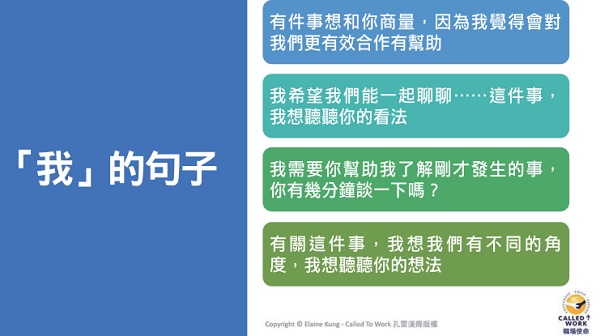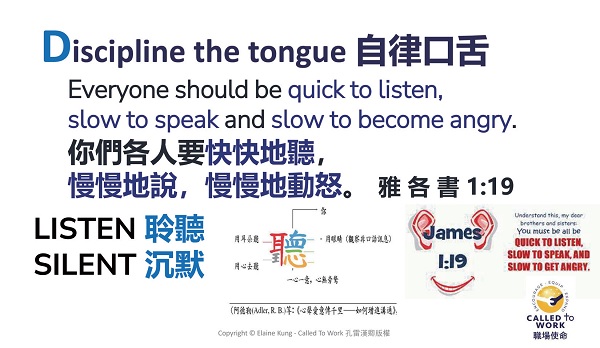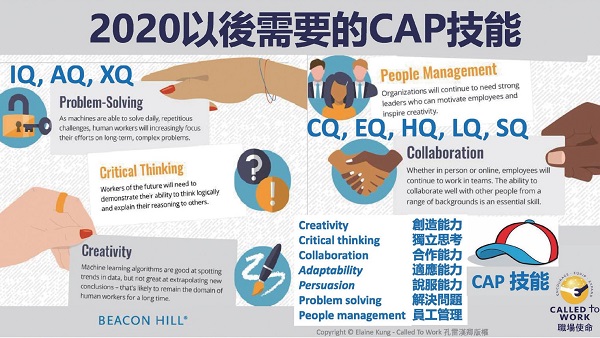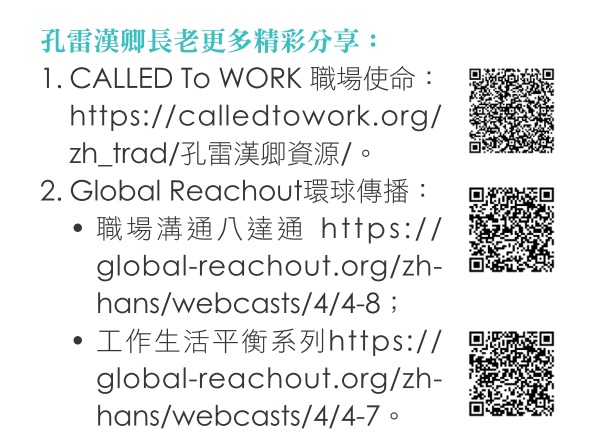Work remotely, have close relationships
[Heavenly Worker] Column
Oral narration and pictures/Kong Lei Hanqing
Interview and arrangement/Yang Xuejing

The development of science and technology and the isolation of the epidemic have prompted human life to enter an era of rapid change, which has also changed work patterns and workplace culture.
Facing such an era, how should Christians hold on to the truth? While the environment is changing drastically, are there any irrefutable principles that apply to both remote work and physical environments?
This article will focus on relationships with people and keeping pace with the times amid changes. It is hoped that people in the workplace in heaven will use biblical teachings to continue to be salt and light in the workplace, live out their faith, and glorify God and benefit others.
All-round relationship—Eight Quotient Leaders
Whether at work or personally, distance can easily create barriers and create crises; the epidemic has also caused unique challenges and tests.
In the workplace, bosses, colleagues, customers, products, and work performance bring pressure; in life, interactions with people and family relationships may also be in crisis. How to view it from the perspective of God and God’s Kingdom?
For Christians, crises can be turning points and good opportunities. There are many advantages to building authentic relationships during times of stress and crisis. The biggest characteristic of people in the workplace in the Kingdom of Heaven is that they have the Holy Spirit working together, rather than working alone. Jesus is among them. No matter at work or at home, God intervenes to allow us to be more effective as salt and light.
The "Eight Business Leaders" manage all-round relationships and are also the eight blessings in life.
The most important thing is "spiritual quotient" SQ, which is the relationship with God. From seeking God's will, you gain wisdom, love and the ability to distinguish good from evil.
In a multicultural environment, establish a relationship with yourself and have a positive self-understanding of yourself, thereby building "character" CQ and "humility" HQ.
Practice "emotional intelligence" (EQ) under pressure and communicate effectively and intelligently.
In the face of technological changes and remote work, build core skills and strengthen IQ agility.
In a world that is changing with each passing day and full of variables, practice "Variable Quotient" XQ flexibility.
Accompany the "adversity quotient" AQ that grows in adversity, thereby forming excellent "leadership" LQ.
By learning to practice the all-round relationship of the "Eight Quotient Leaders", Christians will be able to turn crises into opportunities, fly high against the wind, and expand their horizons.
Let’s start with EQ.
I have learned from thirty years of work experience that emotions are neutral, originate from God’s creation, and cannot be ignored. Understand yourself well, and use self-awareness to better understand others and build relationships with them. Under the pressure of the epidemic, regardless of distance or physical collaboration, correctly managing emotions is the exercise of high emotional intelligence.
What is emotional intelligence? My 18-word key definition:Intolerable words and deeds that devalue youvalue, sway your response.
Be respectful of others, but don't be influenced by others' negative, aggressive, unreasonable and disrespectful behavior. Don't put the responsibility for other people's words, deeds, and attitudes on yourself, and don't be disturbed by the other person's emotions. You must draw a clear line, and when you feel angry, pray to God and ask God for wisdom and discernment. We should not let the blame of other people’s emotions fall on us, and interact with others based on the values taught by God. Manage myself well, maintain consistent integrity, do the right thing, don't let other people's words and actions devalue me, and control my responses.
The so-called empathy is what the Book of Romans says: "Rejoice with those who rejoice and weep with those who mourn." That is, "have the mind of Christ." Think from others' perspective and understand their emotions; have the same thoughts and the same love.
What people need is often not answers but empathy. Don't deny each other's emotions or underestimate other people's problems. Empathy can bring us closer, understand why the other person behaves the way he does, and distinguish the differences between me and me.
The following are exercises in the "Trilogy of Empathy":
1. The same principle of emotions:Help the other person put their emotions, challenges, and stress into your words. Let him know that you not only listen, but also feel the same way.
2. The same principle of caring:Caring, accompanying, and cooperating; taking care of each other's needs; listening quickly and speaking slowly.
3. The same principle as thoughts:Help solve problems at work and help find solutions in thinking. Even from a distance, communication with team members can be enhanced.
Only in this way can we establish a true TRUE relationship of trust, respect, understanding, and empathy.

Care and Wisdom—Practice emotional intelligence and treat others with grace and love
The grace and love that come with empathy are the cornerstones of good relationships. Conflict is inevitable no matter in life or work, but it is also the key to challenging beliefs. To transcend generations and spatial distances and properly handle conflicts, you can practice emotional intelligence through care and wisdom.
1. Four steps of CARE:
COnnection: Actively participate, listen carefully, and express sincerely.
AAppreciate (affirmation and appreciation): Take the initiative to express gratitude to colleagues for the help they provide.
RRecognition: Recognize the contributions of others and respect other people’s ideas.
Engagement (participation): Participate in discussions, think about questions, and solve problems together.
Some students are working remotely during the epidemic and don’t know how to manage peer relationships. After actually practicing the four steps of CARE, he rediscovered the spiritual key to building a relationship between himself and his partner.
2. Wisdom WISE four steps:
Wait: Wait a minute. When it cannot be resolved immediately or you cannot leave the scene, calm down first and ask for another time to talk. This will provide a buffer for each other and help you find a spiritual balcony where you can rest, pray, and wait.
Impact: Compare the possible results of different solutions and respond with high emotional intelligence. Pray for God to give you the calmness and wisdom to see the results and impacts of different actions.
Solve: Conflict is not necessarily negative, and can be constructive if handled properly. The blessings received include: achieving a better shared vision; building better relationships and influence; practicing true Christian faith and experiencing the work of the Holy Spirit. When you understand that solving problems is not a personal matter, you can try to make the pie bigger so that 1+1 is greater than 3. Think from each other's perspective, understand each other's ideas, view differences positively and discuss together to come up with better solutions. Benefit others first and then yourself, so that limited resources can be allocated to achieve a common vision. With trust, respect, understanding and empathy, you can build better relationships and have greater impact.
Express: Learn to express clearly, including thinking and reflection on the problem; apologize when it is time to apologize, and explain when it is time to explain.
A student shared his experience of practicing WISE. The company asked him to attend an anti-racial discrimination meeting, which put him in an inexplicable tangle. So he first calmed down and prayed quietly (Wait). Then discuss with other Christians to clarify your thoughts: What are your motives for not going (Plan A)? What will be the result (Impact)? If you go to (Plan B), what preparations should you make? What impact will it have?
After thinking about it, he found a motivation that was both beautiful and pleasing to God: to better understand each other’s racial differences, to help disadvantaged groups, and to decide not to look at discrimination from a racial perspective, but from a biblical perspective (Solve): God did not create all races. , but "human race"; what God has given is not skin color, but humanity and diversity, so as to seek unity in diversity.
This student saw from a biblical perspective that he could be a vessel for God. During the meeting, we not only sympathized with the harm suffered by other ethnic groups, but also shared our own feelings about being Chinese (Express); we not only discussed race, but also learned to distinguish between good and evil and strengthen our beliefs.

Communication skills - "shine" rather than "moan"
Good communication can help us deal with emotions, resolve conflicts, and become the greatest help in building relationships.
The 66th issue of this magazine, "Service Enters the Workplace, Service Enters the Workplace," mentioned the communication skills that "shine" with high emotional intelligence—servant mentality; humility; honesty and integrity; cultivating respect; and empathy.
Likewise, there are “groaning” communication styles with low emotional intelligence—gossip; intent on revenge; self-pity; violations of biblical values and cliques; negative reactions and personal grudges; selfish agendas and pressure on oneself.
1. "Glowing" ABCDE communication skills:
A-Active listeningactive listening
Be responsive and encouraging. Try to use "I (I)" sentences to express, for example: "You did a good job in this matter, can I know more about it?". Restate the content and the other person's feelings in easy-to-understand words and summarize them, and don't rush to answer. Ask and clarify questions and invite discussion with open-ended questions. Understand the other person’s views, reasons, and concerns from their perspective. Being considerate and compassionate to the other person does not mean total agreement. Express empathy and let the other person know you're willing to be there. Take care of your mood before dealing with things.
B-Body language skills Use of body language
Psychologist Albert Mehrabian pointed out in research that a person's first impression of someone comes from three V's: Verbal; Voice and tone of voice; and the most critical thing is body language (Visual) conveyed visually. The communication principles of body language include: leaning toward the other party appropriately; maintaining an open and relaxed posture; looking at the other party appropriately and making eye contact; focusing and smiling, nodding in response from time to time; actively listening and reflecting the content of the conversation.
During remote meetings during the epidemic, you can also use appropriate body language to interact with people to expand the influence of your image.
C-Character praises praise character
Praise the effort and process, not just the results. Avoid general compliments such as "Great" or "Awesome". Use adjectives that specifically relate to character, such as "responsible," "sincere," "diligent," and "patient." Talk about the other person's admirable qualities so that they understand our expectations. Especially when it comes to raising children, if they can receive specific praise, they will know better where to work.
D-Discipline the tongue
The structure of the Chinese word "listen" conveys this concept: "Respect the other person as a king with your heart, listen with your ears; look at the other person with your eyes; concentrate on the other person without any distractions." The English word "listen" (LISTEN), the letters are reorganized. It became SILENT. It can be seen that the basic principle of listening is self-discipline: do not interrupt or continue talking.
I used this to develop a motto of self-discipline:Open less Chrysostom; moreexplaingolden words.
According to the teachings of the Bible, speaking less of Chrysostom is“It is considered wise for a fool to remain silent; if he keeps silentexplainIt can also be considered smart. ” (Proverbs 17:28)Just say more golden words"One wordexplainWhen they are in harmony, they are like golden apples in a silver net. ” (Proverbs 25:11)
Think before you speak; speak words that are true, helpful, inspiring, noble, and kind. If it doesn't encourage, affirm, and build people up to create trust and good relationships, avoid speaking out.

E-Express affirmation expresses affirmation
How to express affirmation positively? With an appreciative attitude, be keen to discover what the other party has done well or what needs improvement, express appreciation and give congratulations and recognition. Don’t magnify the imperfections. For example: "I like how proactive you are in making arrangements."
Learn to accept each other's differences, express your willingness to understand by respecting and listening carefully: "I am listening, and I am willing to respect you; I understand, can you tell me more about your thoughts?" Use sincere expressions to achieve consensus in cooperation perspectives, interests and goals. In terms of communication vocabulary, making good use of "maybe" can not only express sincerity but also make the other party feel comfortable. For example: "If we..., maybe we can..."
Don’t be hypocritical, be consistent with your words and deeds; when you need to apologize, apologize sincerely and immediately. For example: "I'm sorry, I was wrong. I didn't think carefully and jumped to conclusions too early."
2. Don’t be a slave to “moaning” communication
People with high emotional intelligence do not shy away from their responsibilities, even if they are very small. When explaining the problem, do not emphasize the responsibility of others and blame others with: "They said...; they did...; they denied...; they promised...". Instead, use "I" sentences such as: "I forgot...; I thought...
We have been married for 35 years and have seen many examples from my husband. Many times he apologized to me even though the fault was mine. Over time, I also learned to change my attitude from blaming to taking responsibility, and applied it to my work to build better relationships with my peers.
The following two ways can help us communicate effectively:
1. Sandwich style
Level 1: Positive feedback. Give affirmation for things that are well done and right, for example: "I appreciate you for sticking to your responsibilities."
Second level: specific suggestions. Point out more details, specific comparisons, and ways to improve. Avoid using "but" and "however" in wording; use "and" and "maybe" more often, for example: "I suggest that you maybe pay more attention..."
Level 3: Point out the benefits, for example: "In this case, our project will be more successful because of your contribution."
2. Wise appeals
Make good use of "I" sentences, first empathize with the other person's needs and expectations, explain your current status and difficulties, and accurately propose a solution time and plan. For example: "I understand you want me to do this because..." "I have difficulty with this because..."
The mother asked the child to help take out the garbage, but he could not do it immediately, so he explained to the mother: "I know you really need me to take out the garbage, because the garbage can is full and smelly. I can't do it right now because I am having an online discussion with my classmates. The game ends in half an hour. Can I go down immediately after the game ends?"
These are sensible appeals. This is a very effective communication skill whether between superiors and subordinates or between parents and children.

▲No matter how the times evolve, people in the Heavenly Kingdom workplace can still manage all-round relationships by leading the Eight Businessmen and narrow the distance between themselves and God.
New vision, new direction—creative IQ, adaptability quotient
One of the changes brought about by the epidemic is the need to work remotely and face family members for a long time, which increases invisible load and pressure. Ask the Lord to give us new eyes and see that He not only allows us to "work from home", but also requires us to "work ON home"; it is not a "shelter in place" order, but a "shelter in place" order. "Lord" means shelter in God. God is the head of the family. You should cherish the golden opportunity to build beautiful memories with your family and maintain lifelong relationships.
Possible ways are: respect each family member as an independent individual; use creativity to find activities suitable for the whole family to share; encourage positive changes through rewards, even if they are small, they are worthy of celebration; avoid preaching, commanding, and controlling. When soliciting opinions from family members, accept their ideas as much as possible; be willing to learn from family members with a humble attitude and let them take responsibility; share the joys, sorrows and joys of life together.
Franklin, one of the founding fathers of the United States, said: "Change is the only constant in life. Your ability to adapt to this era will determine the success or failure of your life." It is undeniable that God is raising a new era of rapid progress. How should we face it? What about technology, the epidemic, and all kinds of drastic changes across cultures and generations?
Research organization Beacon Hill mentioned that after 2020, the most important talent trait is the ability to learn and apply to solve problems; not afraid of failure, change and the unknown.
Compared with artificial intelligence (AI), robots do not know what tomorrow will bring, but humans have the ability to think ahead. Robots are not creative and cannot empathize, but humans are creative and can think independently, solve problems and manage emotions, highlighting the ability to collaborate.
The Center for Creative Leadership in the United States also proposed four core skills in the workplace: self-awareness, communication skills, influence, and learning agility. Among them, the agility of learning is the so-called IQ.
IQ is not only about curiosity and the ability to use data, but also about being able to solve problems. That is to say: be able to think independently and use intuition; produce a higher level of critical thinking, digest, reflect, and summarize knowledge; apply it to affairs, see their coherence, and find out cause and effect. Then create better practices, solve problems with creativity, see the whole and draw parallels; know and apply, be foresight, and avoid problems in a foreseeable way. Finally, a mature IQ is formed.
Harvard Business School also often mentions the importance of adaptability skills in leadership. If you don’t want to be eliminated, you must practice your adaptability quotient (XQ): the ability to adapt to unknown challenges. "Change Quotient" can adjust emotions, thoughts, and behaviors according to changes in situations and conditions, and maintain the ability to be open to new perspectives, new challenges, and new methods.
With the ability to adapt, you will not be passive, but can proactively think, react, predict, and prevent. Able to accept changes, take action, and learn to adjust to achieve results.
Therefore, the core skills of the 21st century are creativity, critical thinking and collaborative skills in IQ; as well as strong adaptability in change quotient and reverse quotient, which can adapt to various changes and nip problems in the bud.
We hope that no matter how the times change, people in the workplace in Heaven can still manage all-round relationships with the eight quotients of leadership, practice emotional intelligence to love others and themselves, practice practical learning and apply IQ, and actively adapt to changes with high variability quotient. When we do the work at hand according to the truth, treat others with grace and love, and live out the influence of the six M's, we can draw closer to others and to God.

More exciting sharings from Elder Kong Lei Hanqing:
1. CALLED To WORK 職場使命
2. Global Reachout global communication:
• 職場溝通八達通
• 工作生活平衡系列

Note:Six M: Put on Christ and live a godly spiritual character Model godly character; do the work at hand and hand over the results to God; Make good work; Treat people with grace and love; Minister with grace and love; Shape the office cultureMold the culture; have the courage to become a spokesperson for truth and justice; Mouthpiece for truth and justice; become a Messenger of the gospel.
 Respondents
Respondents
Kong Leihanqing(Elaine Kung), founder, president and speaker of "Workplace Mission". He has held multiple technical and business leadership positions at Bell Labs and AT&T, providing career guidance and other life skills needed by people of all ages. After retirement, she and her husband devoted themselves to evangelism and discipleship training. In 1996, he founded the "Called To Work" ministry to encourage Christians to do their jobs well in the workplace, bear good witness for the Lord, receive God's blessings in the workplace, and become a blessing to others, equipping Christians to become A workplace missionary with "double-vocational ministry".
Yang Xuejing, a native of Taichung, Taiwan, graduated from the Chinese Department of Tunghai University. He once worked as a copywriter for an advertising company and a high school Chinese teacher. After coming to the United States, he settled in Texas and participated in local Chinese education. I hope that through words, more people will know the gospel and the values of heaven will be spread widely.
